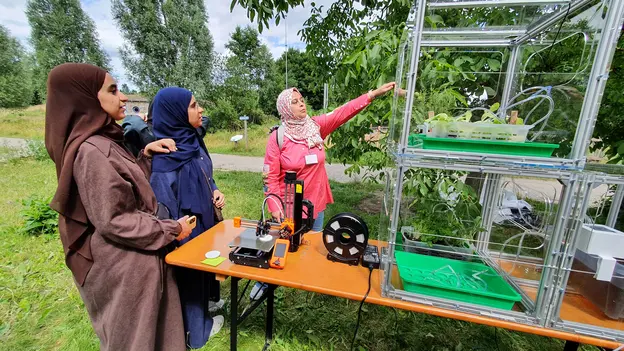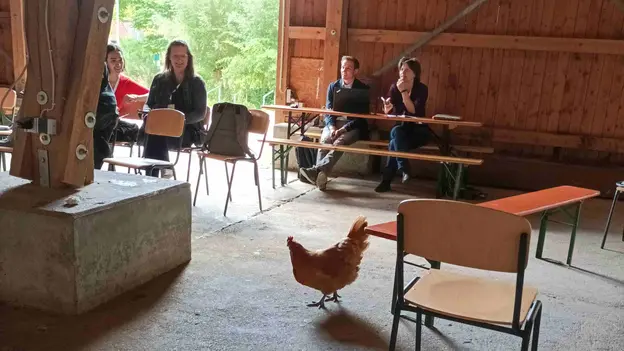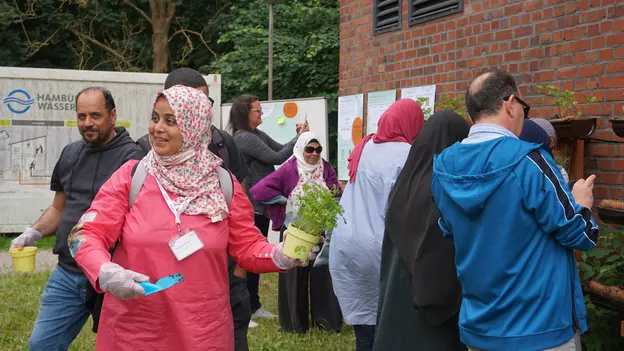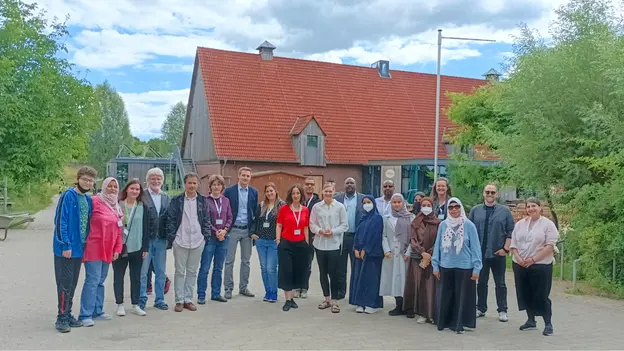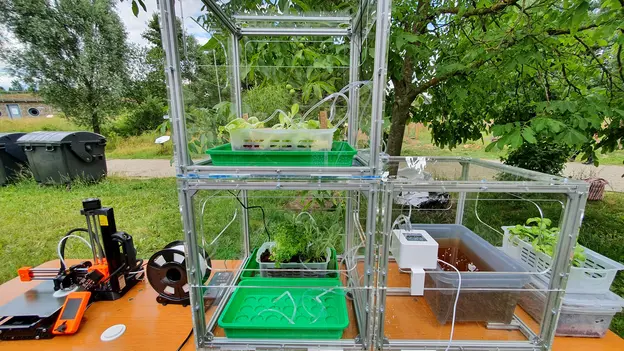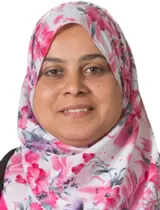Tandem Project & Alumni Project
Vertical Farming and Innovative Urban Agriculture
Workshop
Scientists around the world alert that the production of food worldwide must significantly increase in the next decades. This is to meet the demand of the population in 2050, which is expected to grow to almost 10 billion inhabitants according to the UN World Population Prospects. Innovative farming solutions might support this goal, which is also one of the Sustainable Development Goals of the United Nations, namely SDG 2: End hunger, achieve food security and improve nutrition and promote sustainable agriculture. Also, the growing demand for regionally produced goods puts the spotlight on urban areas and cities, which are expected to host about 80 % of the world population in 2050.
In urban agriculture, vertical farming is an innovative approach to produce high quantities of nutritious and quality fresh food all year round, without relying on skilled labour, favourable weather, high soil fertility, or high water use. Vertical farming is the production of plant products within urban areas in multi-story buildings. These vertical farming systems are fully enclosed and climate-controlled, completely removing external pressures such as disease, pest, or predator attacks.
Transdisciplinary workshop examines the potential of vertical farming systems
In a workshop setting, success stories of sustainable farming in Egypt, Germany, Oman, Saudi Arabia, Sudan, Tunisia, and the United Arab Emirates were discussed and exchanged. Each country found its own practical approach to vertical farming. In Germany and the United Arab Emirates, vertical farms are being created in container farms and plant factories on a large scale with often fully automated systems, which are constantly subject to optimization. Sabine Wittmann and her team at the University of Applied Sciences Weihenstephan-Triesdorf, for example, are testing how different light spectra influence the growth and quality of plants in vertical farms. Various projects in the UAE have successfully started to grow non-native fruits and vegetables, like pineapples, cucumbers, eggplants, lettuce, and cauliflower, in greenhouses with hydroponics systems or on vertical farms.
For the UAE, vertical farms are a major step towards future independence from food imports, which currently cover 80 % of food requirements.
AGYA Alumna Dr. Henda Mahmoudi, Plant Biology, International Center for Biosaline Agriculture, Dubai, UAE
Low-cost innovative vertical farming solutions in Sudan
AGYA members Prof. Dr. Tilal Abdelhalim and Prof. Dr. Amro Babiker from Sudan opened up the potential of connecting elements of vertical farming with the traditional Sudanese Jubraka system. Jubraka refers to the cultivation of small-scale parcels of land mainly near the house, which is planted with early-maturing vegetables and serves as a supplementary and urgent source of food and income. It is a mostly female farming activity. Jubraka is originally a rain-fed cropping system with a high level of plant diversity. Therefore it is a very sustainable agroecosystem that conserves biodiversity and plant genetic resources.
The presentation was also a plea for the importance of traditional farming types for science today. In the case of the Jubraka, the investigation of the genetic diversity of crops from different villages in Sudan has led to the improvement of crops making them more resistant to external stress factors. For many years, Tilal Abdelhalim and his team are conducting regular field schools with local farmers. The empowerment of small-scale farmers is increasing food security and provides an income source for low-income families and Internally Displaced Persons in Sudan.
Aquaponics – the future of agriculture in Tunisia?
Also in Tunisia, the future of agriculture lies in the empowerment and knowledge transfer to small-scale farms. Benefiting from modern communication tools, Tunisian farmers and scientists have discovered the advantages of mobile apps. For the farmers it increases the effectiveness when it comes to the correct identification and treatment of plant diseases, for the environment it reduces the amounts of pesticides used, and for the scientists, it offers an easy way to map the distribution of different plant diseases – a win-win-win situation.
Another promising and growing industry in Tunisia are aquaponics systems. On aquafarms, high-quality pesticide-free vegetables and fish are produced at the same time.
Rami Hamza, Start-up Creator and Pioneer Farmer, Tunis, Tunisia
In a circulation system, the plants are fed with water including the feces of the fish, the remaining water is then returned to the fish tank. New concepts in Tunisia have started to include the production of mushrooms in the cycle.
DIY – Vertical Farming solutions for everyone!
Next to the panel sessions and presentations, the participants had also the chance to get some hands-on experience. AGYA member Sonja Buxbaum-Conradi together with her team at the Helmut-Schmidt University in Hamburg developed two DIY vertical farming system prototypes, one for outside and one for inside. The prototypes were assembled and planted during the workshop. The designs are modular and scalable so that they can be adapted to local and personal needs. The construction manuals will be made available as ‘Open Source Hardware’ with a standardized documentation to be replicated, modified, and advanced by anyone interested in rebuilding it. They will be available here (in German).
The need for increasing sustainability – also for Vertical Farms
Despite the great exchanges full of new ideas, all participants agreed that one challenge remained to make vertical farming even more accessible: 100% artificial light, climatisation, humidification, ventilation, and constant data and sensor controls all day long, this all results in high energy consumption for vertical farms. Researchers are already calculating different energy models with different energy sources. So hopefully, further advancements can be expected in the future of vertical farming.
- Disciplines Involved
- Plant Biology, Molecular Biology, Agriculture, Agricultural Economy, Engineering, Nutritional Sciences, Economic Geography
- Date
- 4 - 6 July 2022
- Venue
- Gut Karlshöhe, Klimaschutzstiftung Hamburg, Germany
- Cooperation Partners
- Gut Karlshöhe, Klimaschutzstiftung Hamburg, Germany
- Helmut Schmidt University, Hamburg, Germany
- American University in Cairo, Egypt
- Project Title
- Vertical Farming: A Food Security Solution for Poor-Resources Countries
- Year
- 2022
- Funding Scheme
- Tandem Project & Alumni Project
- Countries Involved
- Egypt, Germany, United Arab Emirates
